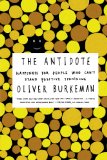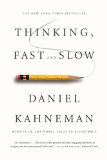Summary | Excerpt | Reading Guide | Reviews | Beyond the book | Read-Alikes | Genres & Themes | Author Bio

The Power of Thinking Without Thinking
by Malcolm GladwellDrawing on cutting-edge neuroscience and psychology and displaying all of the brilliance that made The Tipping Point a classic, Blink changes the way you'll understand every decision you make. Never again will you think about thinking the same way.
Malcolm Gladwell redefined how we understand the world around us. Now, in Blink, he revolutionizes the way we understand the world within. Blink is a book about how we think without thinking, about choices that seem to be made in an instant - in the blink of an eye - that actually aren't as simple as they seem. Why are some people brilliant decision makers, while others are consistently inept? Why do some people follow their instincts and win, while others end up stumbling into error? How do our brains really work - in the office, in the classroom, in the kitchen, and in the bedroom? And why are the best decisions often those that are impossible to explain to others?
In Blink we meet the psychologist who has learned to predict whether a marriage will last, based on a few minutes of observing a couple; the tennis coach who knows when a player will double-fault before the racket even makes contact with the ball; the antiquities experts who recognize a fake at a glance. Here, too, are great failures of "blink": the election of Warren Harding; "New Coke"; and the shooting of Amadou Diallo by police. Blink reveals that great decision makers aren't those who process the most information or spend the most time deliberating, but those who have perfected the art of "thin-slicing" - filtering the very few factors that matter from an overwhelming number of variables.
Drawing on cutting-edge neuroscience and psychology and displaying all of the brilliance that made The Tipping Point a classic, Blink changes the way you understand every decision you make. Never again will you think about thinking the same way.
Blink combines one part popular science, one part market research and one part self-help in a book that, if it were a meal, would be heavy on the canapés but light on the main course...continued
Full Review
 (531 words)
(531 words)
(Reviewed by BookBrowse Review Team).
Malcolm Gladwell has been a staff writer
with The New Yorker magazine
since 1996. He is the author of two
books,
The Tipping Point: How Little Things
Make a Big Difference, (2000) and
Blink: The Power of Thinking Without
Thinking (2005).
From 1987 to 1996, he was a reporter
with the Washington Post, where he
covered business, science, and then
served as the newspaper's New York City
bureau chief. He graduated from the
University of Toronto, Trinity College,
with a degree in history. He was born in
England, grew up in rural Ontario, and
...

If you liked Blink, try these:

by Oliver Burkeman
Published 2013
A witty, fascinating, and counterintuitive read that turns decades of self-help advice on its head and forces us to rethink completely our attitudes toward failure, uncertainty, and death.

by Daniel Kahneman
Published 2013
Engaging the reader in a lively conversation about how we think, Thinking, Fast and Slow will transform the way you think about thinking.
There is no science without fancy and no art without fact
Click Here to find out who said this, as well as discovering other famous literary quotes!